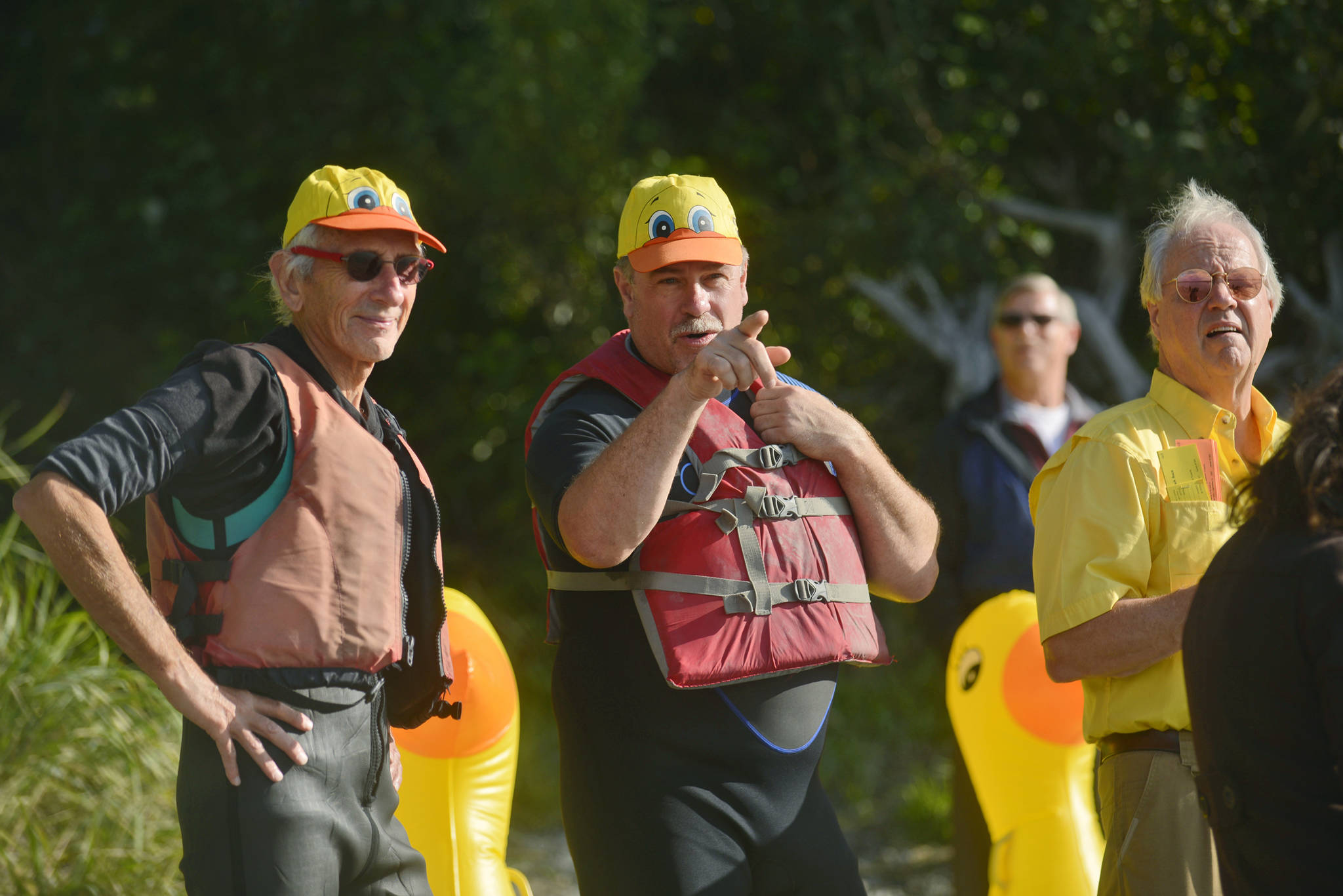Of the approximately 650 to 700 yellow rubber ducks floating down the Kenai River on Monday morning — released upstream of Kenai’s Cunningham Park by the Kenai Lions Club during their 22nd annual duck race fundraiser — most had been pushed by the current into two large clumps. One duck, however, had broken free of the others and was drifting ahead.
“Is that duck going to win?” asked volunteer Jared Oberts, riding in his uncle John Oberts’ boat, wearing a Lions Club vest over his lifejacket. It was Jared Oberts’ fourth year helping with the race, in which the Kenai Lion Club solicits individuals to sponsor ducks — $20 each — for the prize of $7,000 on the winning duck. John Oberts, a Lions Club member and this year’s top duck salesman — he sold about 300 race tickets, earning about $6,000 for the Lions Club’s charitable vision programs, according to Lions Club secretary and treasurer Dennis Swarner — estimates he’s participated in 12 duck races.
“You can’t tell,” John Oberts said. “There are a lot of variables — the currents, the eddies, the breezes. Everything.”
“I think one year there were some harbor seals bopping around,” said Kenai mayor Brian Gabriel, who was riding in Oberts’ boat.
Gabriel and his fellow mayor, Soldotna’s Pete Sprague, had just experienced the river’s capriciousness first hand. Upriver of Cunningham Park, the two had climbed out of a boat and on to two person-sized inflatable rubber ducks — Sprague taking a fall into the water while doing so — to participate in a new event for the long-running fundraiser: human racing.
In last year’s rubber duck race, Swarner himself mounted one of the inflatable ducks and joined the toys drifting down river. What was then a one-off stunt had provoked some discussion among Lions Club members, Swarner said.
“That was cool, they told me — but you need to figure out how to make money on it!” Swarner said.
The mayor’s race — in which participants bought $10 tickets on one mayor or the other, and a drawn name from the winning side earned half the pot, with the Lions keeping the other half — was the answer. Swarner said most of the tickets had been on Gabriel — probably, he said, because most had been sold in Kenai.
The two mayors found out the currents can be as fickle as voters. Although Sprague took an early lead, Gabriel ended up passing the stairs at Cunningham Park — the finish line — far ahead his opponent. Sprague drifted ashore and Oberts picked him up before before heading back to Cunningham Park to collect the next racers down the Kenai River: two large clear bags full of about 300 rubber ducks each.
Like everything else on the river, the speed of the rubber ducks depends. Oberts said last year’s race lasted about 15 minutes. This year the ducks ran on an outgoing tide, and the race took about six minutes — followed by about 15 minutes of cruising the river to scoop the ducks up by net and by hand.
The clumps of rubber ducks had drifted apart by the end of the race, and it’s not clear whether the duck with an early lead was the one that crossed first by the Cunningham stairs, where two volunteer boats strung a rope between them for a finish line. The duck that did, however, was number 327, whose winning ticket had been bought by Cassie Olson of Soldotna.
Though the new mayor’s event proved popular, Swarner wasn’t sure whether or not next year’s rubber duck race would have human participants. He joked that after having gotten two mayors to ride rubber ducks down the Kenai River, next year the Lions may invite gubernatorial candidates.
Reach Ben Boettger at ben.boettger@peninsulaclarion.com.

